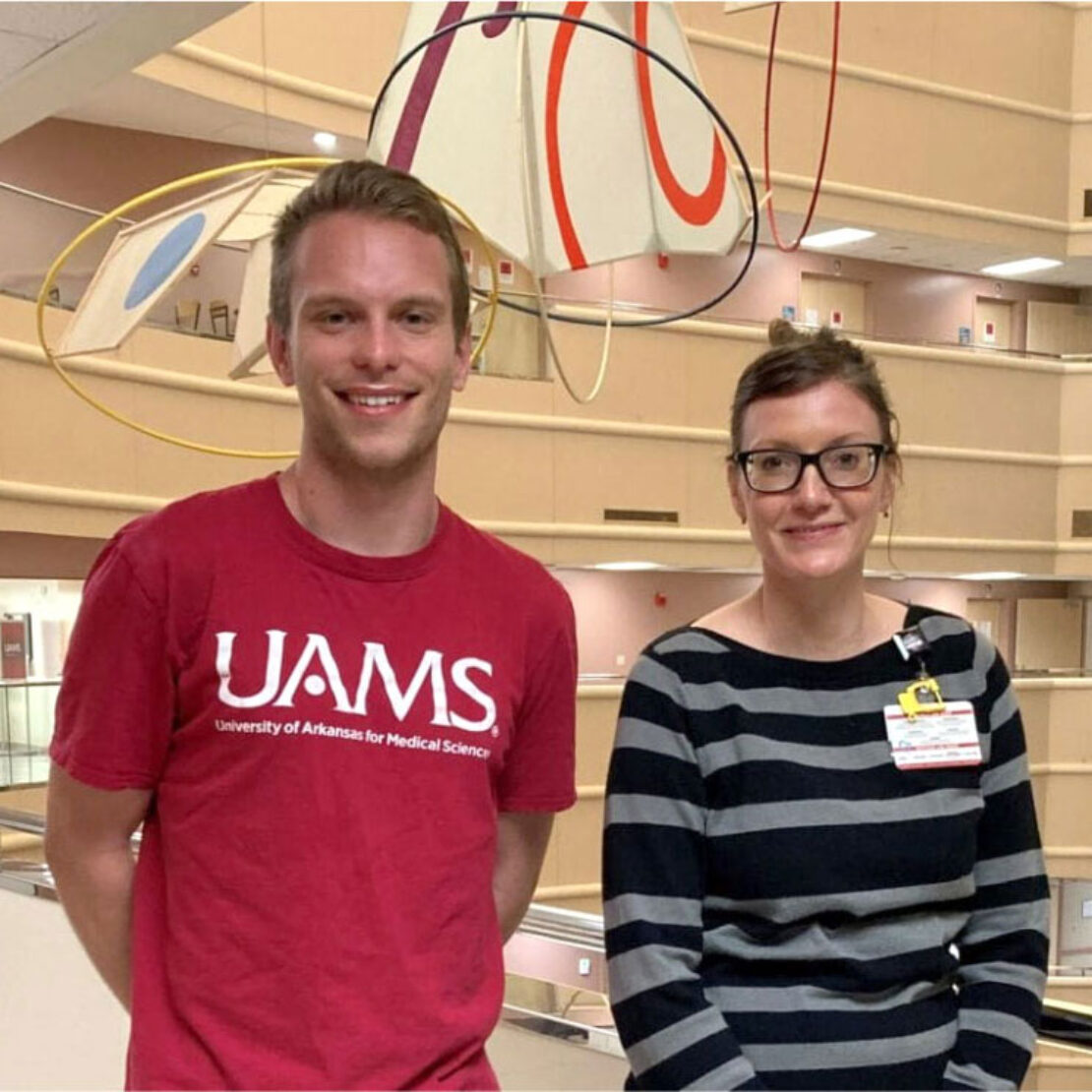
Photo caption: King alumnus and NSF graduate fellowship recipient Mason McCrury, left, and Samantha Kendrick, Ph.D., associate member, Winthrop P. Rockefeller Cancer Institute
Alumnus Profile: Mason McCrury ‘21
Mason McCrury is originally from Austin, Texas, but it didn’t take him long to realize that going to school in Bristol was going to be one of the best decisions of his life.
Recruited by Coach Ryan Booher to play volleyball, Mason immediately felt like he was part of the King community.
“Both he (Booher) and the team were so welcoming during my first visit to King,” he said. “Also, the beauty of the campus certainly helped. And I chose King because of its well-roundedness in education programs and the individualized attention each student receives.”
Mason was recently awarded a prestigious National Science Foundation (NSF) Graduate Research Fellowship, and he is now pursuing a doctorate in Biochemistry and Molecular Biology at the University of Arkansas for Medical Sciences (UAMS). The fellowship provides tuition, fees, and a three-year stipend supporting his dissertation.
His dissertation project, titled “Investigating DNA Secondary Structure Formation and Mutagenesis,” focuses on non-Hodgkin’s lymphoma and is being conducted under the advisement of Dr. Samantha Kendrick, who was recently awarded a substantial Department of Defense grant to help support veterans with lymphoma.
Earning such an esteemed fellowship caught Mason somewhat off guard.
“I am so honored to have received this fellowship,” he said. “To be honest, I was shocked! The fellowship has over 12,000 applicants each year across just about every field of science. I am incredibly grateful to my mentor here, Dr. Kendrick, who pushed me to apply, and the Biology department at King, especially Dr. Ong, who was a graduate research fellow himself.”
Mason is diligently working toward his doctorate, and says his path so far has been a relatively smooth one.
“Things are going well here,” Mason said. “I’ve been able to publish a couple of papers in my first two years, and I am preparing for my rapidly approaching Ph.D. candidacy exam. I am so grateful to be surrounded by an incredible team of scientists and mentors, without whom I could not have accomplished any of the above. And I have everyone to thank at King for having helped me arrive here!
Mason’s dissertation project focuses on the development and relapse of diffuse large B cell lymphoma (DLBCL), a subtype of non-Hodgkin’s lymphoma.
“I chose this project because, despite major improvements in the standard of care, DLBCL remains the most common hematological malignancy worldwide and in the U.S., with relapse rates remaining around 40%.
“I was granted a lot of freedom by Dr. Kendrick to make the project my own, but the goal remains the same: to identify the mechanisms by which lymphoma occurs and relapses in order to develop interventions that improve patient outcomes.”
Having the opportunity to attend King, Mason says, prepared him well for this next chapter in his life.
“I can honestly say that I would not have attended grad school if it weren’t for the guidance I received from faculty and staff, especially in the Biology department,” he said. “They saw something in me that I did not necessarily see in myself, and they really took the time to guide me, challenge me, and foster the development of my specific abilities.”
As a result, Mason looks back on his time at King with a sense of gratefulness and warmth.
“As cliché as it may sound, my best memories really were just building a group of close friends and all the memories we shared, from traveling the nation with the volleyball team to hanging out with friends from all over the world in the dorms,” he said. “The special thing about King is that everybody is friends with everybody; King really facilitates a caring, accepting family environment from the top down and shows in the culture created among the students.”
And what would he tell students who are thinking about attending King University?
“I would tell anyone considering King that this place will truly change your life,” he said. “I received a lot of individualized attention and fellowship that I would not have received at most other schools.
“From playing on the volleyball team, majoring in Biology and Spanish, serving as a resident assistant, to multiple on-campus jobs … I met so many people who I remain close to today. From President Whitaker down, I was met with open arms and was pushed to be my best self – academically, athletically, and spiritually.”